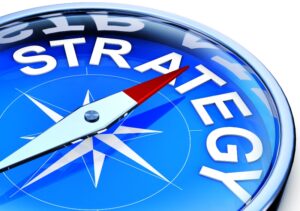Strategy and timing will outperform wishing and hoping
 If you’ve started this year with good intent but are already in a fog, you still have time to get back on track. Your New Year’s resolutions may have been the catalyst, but your intentions will end there if you don’t pin them down. Assigning realistic timelines and considering how to achieve measurable results requires commitment and a thoughtful strategy. Creating goals (as opposed to wishes) is the first step in getting on the right track to where you want to be.
If you’ve started this year with good intent but are already in a fog, you still have time to get back on track. Your New Year’s resolutions may have been the catalyst, but your intentions will end there if you don’t pin them down. Assigning realistic timelines and considering how to achieve measurable results requires commitment and a thoughtful strategy. Creating goals (as opposed to wishes) is the first step in getting on the right track to where you want to be.
Some people execute plans very well. But being able to view the broader picture and see the reasons to change course is a little trickier. Those adjustments involve strategic thinking. Having a clear strategy (and a positive mindset) will be instrumental in helping you achieve your goals, no matter how much your circumstances may change as you move forward.
A strategy provides a framework to keep you on the right path.
A strategy provides a framework to keep you on the right path. Many people begin with tactics first, such as creating a website or resume without a bigger plan. This approach can lead to a costly investment when circumstances change. Another mistake is doing the same thing again (and again) without evaluating your results as they relate to your goals.
If you’re not getting the results you want from your job search or business development efforts, then something needs to change. Focusing only on tactics can lead to missed opportunities. You must be willing to consider more scenarios for achieving your dreams. Without a strategy to drive your plan and its execution, your efforts could end up being a complete waste of time.
Develop an action plan that supports your strategy.
 For that reason, start with a long-term goal and work backward. Embrace the circumstances around you and be willing to pivot as you look forward. If you keep your eye on the prize, you can develop an action plan that supports your strategy. This method is much more impactful than accomplishing tasks that only deal with what is happening at that moment.
For that reason, start with a long-term goal and work backward. Embrace the circumstances around you and be willing to pivot as you look forward. If you keep your eye on the prize, you can develop an action plan that supports your strategy. This method is much more impactful than accomplishing tasks that only deal with what is happening at that moment.
Ever felt stuck in a situation and unsure about what to do next? Well, here’s a prompt – keep the bigger picture in mind! It’s like having a compass that guides you toward your true north. With a clear perspective, you can pivot or change gears to reach your goals. New options can appear that may not match your plan at first glance. But when you see them as a step towards where you ultimately want to go, they are just a different route than you planned.
Your goals need to be the drivers.
There are times when new information will interrupt your flow. Schedules are great because they provide structure. And although structure is helpful for planning purposes, structure shouldn’t drive an action plan. Your goals need to be the drivers. It’s important to remain aware of the goal and adjust your plan when circumstances change. If you don’t have a career strategy, you could be slow to switch gears when things around you change.
In a broader sense, you’re at a disadvantage if you don’t understand the strategy behind your company’s goals. You end up being dependent on the people who designed the organization’s strategy to dictate your action plan. How will you know what to do if conditions change? You have to be clear about why an organization needs you. Without this knowledge, you’re at risk. You face wasted efforts, missed opportunities, and potentially, being left out in the cold. Understanding your company’s strategy and having one of your own allows you to land on your feet when things go off course.
Delays can limit your options.
 Another point to recognize is the relationship between strategy and timing. If you think delaying action for an hour or two, or even days, won’t make much difference to your desired outcome, think again. Consider how planes land and take off. The precision required to enter airspace at the right time to avoid collisions is critical. Imagine what would happen if pilots believed their intentions were more important than their actions. The same applies to someone in job search mode or planning a new business. Understanding the reasons behind your actions is critical to helping you predict potential negative consequences resulting from deviations in timing. They will hopefully also allow you to work out ways to avoid them. Missing a deadline or taking too long to respond to a request can cause you to miss an opportunity. Delays can limit your options and change how you will achieve your goals.
Another point to recognize is the relationship between strategy and timing. If you think delaying action for an hour or two, or even days, won’t make much difference to your desired outcome, think again. Consider how planes land and take off. The precision required to enter airspace at the right time to avoid collisions is critical. Imagine what would happen if pilots believed their intentions were more important than their actions. The same applies to someone in job search mode or planning a new business. Understanding the reasons behind your actions is critical to helping you predict potential negative consequences resulting from deviations in timing. They will hopefully also allow you to work out ways to avoid them. Missing a deadline or taking too long to respond to a request can cause you to miss an opportunity. Delays can limit your options and change how you will achieve your goals.
Understand your target’s wants and needs.
Throwing stuff at the wall to see what sticks is a tactic that rarely pays off in the way we imagine. Haphazard spurts of energy may produce results of some kind, but they’re seldom sustainable. Without a strategy, they can lead to more wasted efforts. They may also lead to false hope when the initial response goes nowhere. An example is shooting out resumes or marketing pieces to random audiences. There may be an initial response based on curiosity, but this tactic may miss the mark if want a productive relationship. Likewise, indiscriminately applying for posted jobs or focusing on developing a clever media presence and hoping someone will find you are both a gamble. A more sure bet requires digging in and doing the necessary research to understand your target’s wants and needs.
Evaluate your actions and how they support your goals.
 A strategy is the overall picture of what these components look like. Learning about the skills required to deliver the results your target companies need is much more likely to tell you how realistic your goals are. Be aware of the timing of special events, when budgets get done, and when seasonal fluctuations typically occur. This information will help you develop an effective strategy for going after what you want. Timing your actions according to the intelligence you gather and committing to specific tasks at specific times will help you move forward. It’s critical to track your progress. Evaluate your actions and how they support your goals. This process will help you identify why your results may be off-course. Overall, a well-thought-out strategy for achieving your goals and an awareness of critical timelines will help guide you when you face difficult decisions or reach a brick wall.
A strategy is the overall picture of what these components look like. Learning about the skills required to deliver the results your target companies need is much more likely to tell you how realistic your goals are. Be aware of the timing of special events, when budgets get done, and when seasonal fluctuations typically occur. This information will help you develop an effective strategy for going after what you want. Timing your actions according to the intelligence you gather and committing to specific tasks at specific times will help you move forward. It’s critical to track your progress. Evaluate your actions and how they support your goals. This process will help you identify why your results may be off-course. Overall, a well-thought-out strategy for achieving your goals and an awareness of critical timelines will help guide you when you face difficult decisions or reach a brick wall.
For more career advice, check out my webinars on Goal Setting – Getting Focused, Managing Multiple Commitments – Getting it all done!, Career Assessment and follow me on LinkedIn and (X) Twitter.





